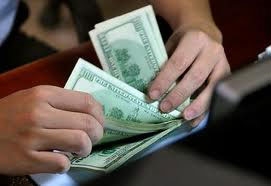Local currency struggling to keep its head above water
 |
| illustration photo |
The central bank set a new Vietnam dong and US dollar trading rate at VND20,500-20,900 per US dollar, an increase of 9.3 per cent against the previous rate.
The selling rate in black market reportedly slightly climbed to VND21,540 a dollar in Ho Chi Minh City and VND21,550 a dollar in Hanoi.
Transactions in black market have kept bustling before and after Tet, which fell on February 3.
In an attempt to calm speculation that the dong would be devaluated before Tet, on January 28, Government Office Minister Nguyen Xuan Phuc announced that there would be no devaluation before the holidays, but that after the Lunar New Year. “The government will examine the foreign exchange rate more carefully,” he said.
Before Tet, the dollar was traded at VND21,500 per dollar, around VND500 higher than levels recorded in early January, 2011. Last week, Minister of Planning and Investment Vo Hong Phuc told local press that the foreign exchange reserves were above $10 billion at the end of 2010.
Viet Capital Securities Joint Stock Company research director Marc Djandji said though it remained unclear as to how much “above” $10 billion the reserves were, the estimated figure stood around $12-13 billion. “Pressure remains on the currency in unofficial markets compared to the end of January,” said Djandji.
On the trade deficit front, January’s shortfall came in at $1 billion, which was a slightly larger than the shortfall of approximately $980 million booked in the same month last year but smaller than the $1.3 billion reported in December 2010.
HSBC’s economist covering Southeast Asia Sherman Chan said foreign trade numbers in recent months showed that exports had been growing much faster than imports.
“If this trend persists, the trade deficit should narrow. However, the government has set a larger trade deficit target for 2011 ($14 billion) than the actual figure for 2010 ($12.4 billion). There is still room for improvement in narrowing the trade deficit, but the government’s annual target suggests aggressive policy actions are unlikely,” said Chan.
In this situation, Chan said that foreign investors were likely to also keep a close eye on the development of long-standing issues such as high inflation and continued depreciation pressures on the dong.
“Policymakers need to adequately tackle such concerns in order to revive and sustain market confidence,” said Chan.
What the stars mean:
★ Poor ★ ★ Promising ★★★ Good ★★★★ Very good ★★★★★ Exceptional
 Tag:
Tag:
Related Contents
Latest News
More News
- Cashless payments hit 28 times GDP in 2025 (February 04, 2026 | 18:09)
- SSIAM and DBJ launch Japan Vietnam Capital Fund (February 04, 2026 | 15:57)
- Banks target stronger profits, credit growth in 2026 (February 04, 2026 | 15:43)
- Vietnam on path to investment-grade rating (February 03, 2026 | 13:07)
- Consumer finance sector posts sharp profit growth (February 03, 2026 | 13:05)
- Insurance market building the next chapter of protection (February 02, 2026 | 11:16)
- NAB Innovation Centre underscores Vietnam’s appeal for tech investment (January 30, 2026 | 11:16)
- Vietnam strengthens public debt management with World Bank and IMF (January 30, 2026 | 11:00)
- Corporate bond market poised for stronger growth cycle (January 28, 2026 | 17:13)
- Vietnam's IPO market on recovery trajectory (January 28, 2026 | 17:04)





















 Mobile Version
Mobile Version